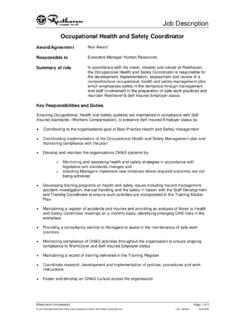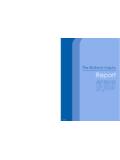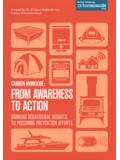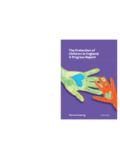Transcription of Comments on the recommendations of the …
1 Comments on the recommendations of the parliamentary Committee on Occupational Safety, Rehabilitation & Compensation Final report into the Referral for an inquiry into the Return to Work Act & Scheme 2017 Self Insurers of South Australia Inc 1 Recommendation Affected section Comments 1 a. Early intervention strategies be implemented as soon as practically possible for all claims, and where appropriate, even prior to determination. b. Re-introduction of provisional liability in the Scheme, limited to only cover payment of early intervention services. 32, 33 a. This is already common practice among self-insurers and should be across the scheme if it is not currently.
2 B. This is a redundant recommendation. Interim benefits under already require the offering of these benefits if the claim cannot be determined in 10 days. Provisional liability was a legally fatally flawed concept that was sometimes abused and posed a risk to worker entitlements and should never be re-introduced. 2 Amend section 7(1)(2)(b)(i) of the Return to Work Act, replacing the significant cause with a significant cause . 7(1)(2)(b)(i) This is opposed outright. The reasoning behind the recommendation is flawed. The Committee appears to equate higher rejection rates of, and more thorough investigation of, psychological injury claims with there being something wrong with the causation wording.
3 In the absence of evidence to support this conclusion, it is just as likely that these trends reflect more accurate investigation and determination of compensability that had not been occurring before that is to say, claims were being accepted that should not have been and are not any longer. In the Committee s own words, the change in wording is yet to be tested fully in the SAET (page 22). It is therefore premature to be suggesting change. It is unlikely to be necessary anyway if the experience of the SAET interpretation of the physical injury causation wording in Brealey & Rullo is repeated. Comments on the recommendations of the parliamentary Committee on Occupational Safety, Rehabilitation & Compensation Final report into the Referral for an inquiry into the Return to Work Act & Scheme 2017 Self Insurers of South Australia Inc 2 Recommendation Affected section Comments 3 Replace the term seriously injured worker with the term worker with high needs for those with WPI greater than 20 per cent, and the term worker with highest needs for those with WPI greater than 30 per cent.
4 21 and consequential Agree in principle that seriously injured is an inappropriate description for workers with substantial remaining work capacity. However the suggested replacement words are no better. Regardless, changing words in the Act rarely has anything more than symbolic value. It is what is required of all parties in respect of the injury status that matters. 4 Include a narrative test to supplement the already prescribed WPI assessment processes. Accredited doctors be trained in its use and application. 21, 22 & consequential Vigorously opposed. Narrative tests are entirely subjective and cannot be made objective even by combination with WPI assessments and application by assessors or courts.
5 The unvarnished truth is they are too easy to game . When Victoria adopted a narrative test as an option to access common law and placed the test in the hands of the courts, common law claims exploded and put scheme funding under significant and ongoing pressure. Experience with WPI assessment in SA to date is also instructive. Some chapters of AMA 5 allow the assessor sometimes wide discretion to load the WPI% based on subjective assessment of impact on ADL and the like. This is a de facto narrative test and the many cases of major variations in WPI results show that any form of test based on subjective descriptions and discretions will lead at best to significant additional disputes and at worst major damage to the scheme.
6 WPI assessment as it stands is an imperfect picture of the total effects of injury on workers but a narrative test is not the answer. Comments on the recommendations of the parliamentary Committee on Occupational Safety, Rehabilitation & Compensation Final report into the Referral for an inquiry into the Return to Work Act & Scheme 2017 Self Insurers of South Australia Inc 3 Recommendation Affected section Comments 5 Broaden the coverage of medical expenses so there will be no time limit for coverage of: reasonable costs associated with medication; or treatment for which there is evidence that the treatment is required to maintain a worker to remain at work [sic].
7 33 Already common practice among many self-insurers. Under current provisions, such extended payments are legally on an ex gratia basis but this is a minor accounting consideration. Such a legislative extension would rely on the adequate application of the test of what is reasonable, including by the SAET. We must be cautious about provisions that may, for example, encourage the extended over-use of opiate or steroid medication. It may require mandated protocols to define reasonableness in the ongoing approval of the use of these types of medication. 6 Ensure that all injured workers have access to return to work services for the full duration allowed in the Return to Work Act, including for the 12 month period after income support ceases.
8 Part 3 Already common practice among most self-insurers. We are unable to comment on practices within the insured scheme. 7 The reasonable costs of future surgery associated with a compensable work-injury to be payable by the Scheme without the precondition the surgery was pre-approved. 33(21)(b)(ii) & (iii) There is no doubt that forecasting future surgery needs for pre-approval purposes can be a fraught process. We are awaiting appeals to clarify what the current provisions actually require given the conflicting SAET decisions in Ledo and Tinti. How that appeal is determined will bear on the future conduct of the pre-approval process.
9 To that extent this recommendation is premature. The current need for pre-approval has a legal basis. Under the current provisions, without pre-approval, any payment for services past the end of the statutory entitlement period is made outside the Act in effect it is ex gratia, meaning that the provisions of the Act, such as fee schedules, the right to claim the costs and the obligation to pay the costs do not operate. In effect it becomes a common law liability claim which is cumbersome at best. Comments on the recommendations of the parliamentary Committee on Occupational Safety, Rehabilitation & Compensation Final report into the Referral for an inquiry into the Return to Work Act & Scheme 2017 Self Insurers of South Australia Inc 4 Recommendation Affected section Comments 8 The 104 week income entitlement is based on the aggregate period of incapacity, whether consecutive or not.
10 39(1) & (3) & consequential Taken literally, such a change would not increase the weekly benefit liability since there are no economic reviews of weekly benefits if the worker is not seriously injured and the benefits are received over a longer period. It would however, act to: Increase the duration over which the 104 weeks of income benefits are paid in some cases Increase the duration over which medical benefits are paid in some cases An actuarial opinion on the impact of this recommendation would be needed before reaching further conclusions. 9 Common law and its inclusion in the Scheme be reviewed as part of the mandated review.











